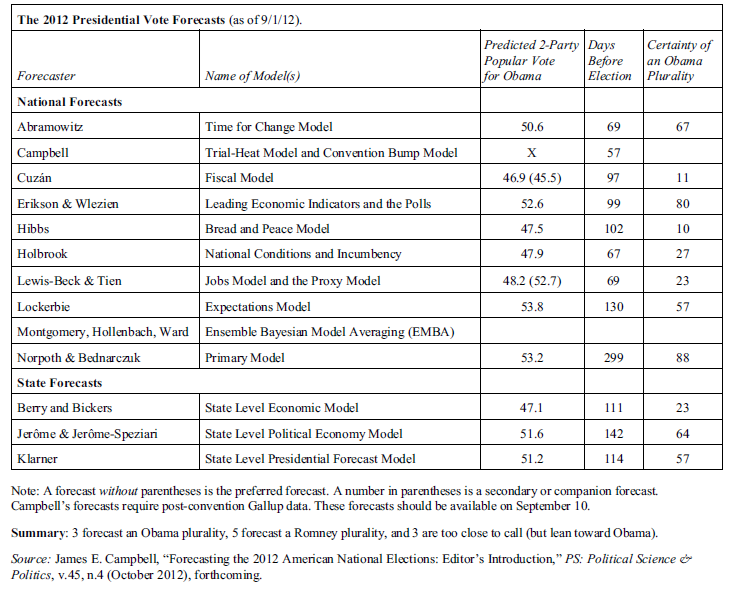Time (and administrative duties) permitting, I’ll be up with my traditional election forecast post later this week, complete with an explanation of my methodology, as it were. In the meantime, just to get the conversation going, here are the latest political science forecasts, (courtesy of Michael Lewis-Beck, whose two forecast models are included.) These will be published in a forthcoming issue of PS (a political science journal), and they were also discussed a couple days ago in this Washington Post article by Dan Balz.
 I’ll discuss these models in some detail in future posts, but there are a couple of points I want to make now. To begin, at first glance it appears that political scientists are rendering a split decision. Six models predict that Obama will win, but five say Romney will be the victor. However, once you factor in the confidence interval surrounding these predictions, three of the forecasts are really indicating that this election is too close to call. I talked about this before in a previous post, but it bears repeating: it’s quite possible that some of these models will be “right” in terms of predicting Obama’s share of the two-party vote within a specified margin of error, even if they get the “winner” wrong. So, for example, if Obama wins 49.5% of the two-party vote and loses the election, a forecast that has him taking 50.6% of the vote is nonetheless considered an accurate forecast.
I’ll discuss these models in some detail in future posts, but there are a couple of points I want to make now. To begin, at first glance it appears that political scientists are rendering a split decision. Six models predict that Obama will win, but five say Romney will be the victor. However, once you factor in the confidence interval surrounding these predictions, three of the forecasts are really indicating that this election is too close to call. I talked about this before in a previous post, but it bears repeating: it’s quite possible that some of these models will be “right” in terms of predicting Obama’s share of the two-party vote within a specified margin of error, even if they get the “winner” wrong. So, for example, if Obama wins 49.5% of the two-party vote and loses the election, a forecast that has him taking 50.6% of the vote is nonetheless considered an accurate forecast.
My second point is that most of these forecasts are predicting that this is will be a very close election. However, as more than one of you has indicated in emails and comments, recent polling data suggests that Obama is pulling away in this race, both in national tracking polls and in swing-state polls. Given these polls, some well-known pundits are suggesting the election is essentially over. As evidence, they cite Obama’s double-digit lead in key swing states like Ohio. Based on these polls, more than one of you has asked me when I will acknowledge that the political science models suggesting this will be a close race are wrong.
To quote the United Kingdom’s Prime Minister Margaret Thatcher, “This is no time to go wobbly.” I have no doubt that the media coverage of Romney’s 47% comments may have contributed to a temporary bump in Obama’s support. But if the political science models are to be believed, the impact of Romney’s secretly-recorded comments will recede, and the fundamentals on which the forecast models are based will, in the end, largely determine the outcome of this race. Current polling notwithstanding, this suggests the race will tighten as we head into the final six weeks of this campaign. So, is the race over, as some pundits suggest? Or will the race tighten as the impact of the “47%” comments recede? I’m putting my money on the political scientists. Obama’s current polling lead notwithstanding, I’m betting the race will tighten.
I’ve carved some time out tomorrow night to live blog the first debate. I’ll be up with a post earlier in the day before the debate to provide some historical context regarding previous presidential debates, but I hope you’ll join in to the live blog.
